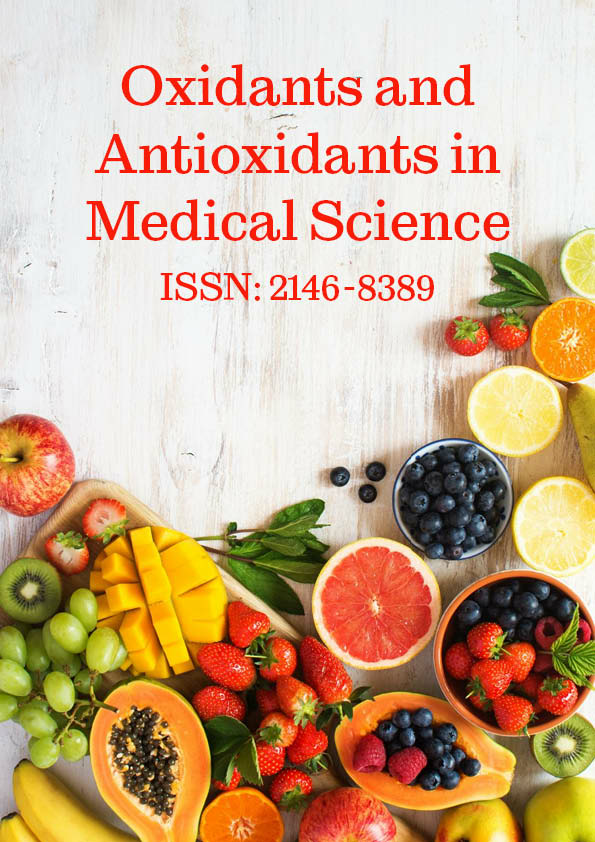Perspective Article - Oxidants and Antioxidants in Medical Science (2023)
The Role of Vitamin C as an Antioxidant and its Benefits for Anemia Patients
Bexley Effie*Bexley Effie, Department of Food Science, University of Massachusetts, Massachusetts, USA, Email: BexleyEffie8@gmail.com
Received: 02-Nov-2023, Manuscript No. EJMOAMS-23-123344; Editor assigned: 06-Nov-2023, Pre QC No. EJMOAMS-23-123344 (PQ); Reviewed: 21-Nov-2023, QC No. EJMOAMS-23-123344; Revised: 28-Nov-2023, Manuscript No. EJMOAMS-23-123344 (R); Published: 05-Dec-2023
Description
Vitamin C, also known as ascorbic acid, is a watersoluble vitamin with powerful antioxidant properties. Beyond its well-known role in supporting the immune system and promoting skin health, vitamin C plays a crucial role in combating oxidative stress, making it particularly beneficial for individuals suffering from anemia. Anemia, characterized by a deficiency of red blood cells or haemoglobin, can result in fatigue, weakness, and overall diminished well-being. Vitamin C acts as an antioxidant and the specific benefits it offers to those dealing with anemia.
Antioxidant properties of vitamin C
One of the primary functions of vitamin C is its role as an antioxidant. Antioxidants are compounds that neutralize free radicals, highly reactive molecules that can cause damage to cells and DNA. Free radicals are particularly harmful to red blood cells, leading to their destruction and exacerbating anemia-related symptoms. Vitamin C helps combat this oxidative stress by donating electrons to stabilize free radicals, thus protecting red blood cells from premature breakdown [1].
Enhanced iron absorption: Anemia is often linked to iron deficiency, a key component of hemoglobin. Interestingly, vitamin C facilitates the absorption of non-heme iron, the type of iron found in plant-based foods and supplements. By forming a soluble complex with non-heme iron in the digestive tract, vitamin C enhances its absorption into the bloodstream [2]. This synergistic effect is particularly valuable for individuals whose anemia is rooted in insufficient iron intake or absorption issues [3].
Collagen synthesis and tissue repair: In addition to its antioxidant properties, vitamin C is essential for the synthesis of collagen, a structural protein vital for the integrity of blood vessels and tissues. This is crucial for anemic individuals, as compromised blood vessels can contribute to bleeding and worsen anemia [4]. By promoting collagen production, vitamin C supports the repair and maintenance of blood vessels, reducing the risk of internal bleeding and improving overall cardiovascular health[5].
Reduced fatigue and enhanced energy levels: Anemia often manifests as persistent fatigue and weakness due to inadequate oxygen transport by red blood cells [6]. Vitamin C plays a pivotal role in maintaining the health of red blood cells, ensuring their optimal function in delivering oxygen to tissues and organs [7]. By mitigating oxidative stress and supporting the integrity of red blood cells, vitamin C helps alleviate fatigue and boosts energy levels in anemia patients [8].
Sources: While vitamin C is abundant in various fruits and vegetables, it’s essential for anemia patients to ensure an adequate intake. Citrus fruits, strawberries, kiwi, bell peppers, and broccoli are excellent sources of vitamin C. For optimal benefits, it is advisable to consume a well-balanced diet rich in vitamin C-containing foods [9].
Antioxidant properties of vitamin C make it a valuable ally in the management of anemia [10]. By protecting red blood cells from oxidative stress, enhancing iron absorption, promoting collagen synthesis, and reducing fatigue, vitamin C offers multifaceted benefits for individuals struggling with this common blood disorder. Incorporating vitamin C-rich foods into the diet or considering supplements, under the guidance of a healthcare professional, can be an effective strategy to complement anemia treatment and improve overall well-being. Always consult with a healthcare provider for personalized advice on managing anemia and optimizing vitamin C intake.
References
- Davis JL, Paris HL, Beals JW, Binns SE, Giordano GR, Scalzo RL, et al. Liposomal-encapsulated ascorbic acid: Influence on vitamin C bioavailability and capacity to protect against ischemia–reperfusion injury. Nutr Metab Insights 2016; 9:25-30.
[Crossref] [Google Scholar] [PubMed]
- Kivirikko KI, Myllylä R. Post‐translational processing of procollagens. Ann N Y Acad Sci 1985; 460(1):187-201.
[Crossref] [Google Scholar] [PubMed]
- Wintergerst ES, Maggini S, Hornig DH. Immune-enhancing role of vitamin C and zinc and effect on clinical conditions. Ann Nutr Metab 2006; 50(2):85-94.
[Crossref] [Google Scholar] [PubMed]
- Ohta Y, Nishikimi M. Random nucleotide substitutions in primate nonfunctional gene for L-gulono-γ-lactone oxidase, the missing enzyme in L-ascorbic acid biosynthesis. Biochim Biophys Acta 1999; 1472(1-2):408-411.
[Crossref] [Google Scholar] [PubMed]
- Cui J, Yuan X, Wang L, Jones G, Zhang S. Recent loss of vitamin C biosynthesis ability in bats. PloS one 2011; 6(11):e27114.
[Crossref] [Google Scholar] [PubMed]
- Zhang ZD, Frankish A, Hunt T, Harrow J, Gerstein M. Identification and analysis of unitary pseudogenes: historic and contemporary gene losses in humans and other primates. Genome Biol 2010; 11:1-7.
[Crossref] [Google Scholar] [PubMed]
- Rangarajan S, D’Souza GA. Restless legs syndrome in Indian patients having iron deficiency anemia in a tertiary care hospital. Sleep Med 2007; 8(3):247-251.
[Crossref] [Google Scholar] [PubMed]
- Fernandez-Gaxiola AC, De-Regil LM. Intermittent iron supplementation for reducing anaemia and its associated impairments in adolescent and adult menstruating women. Cochrane Database Syst Rev 2019(1).
[Crossref] [Google Scholar] [PubMed]
- Stein J, Stier C, Raab H, Weiner R. The nutritional and pharmacological consequences of obesity surgery. Aliment Pharmacol Ther 2014; 40(6):582-609.
[Crossref] [Google Scholar] [PubMed]
- Sharma A, Giri A, Pudasaini S. Prevalence of anemia in children aged 6 months to 15 years: a hospital based study. J Pathol Nepal 2017; 7(2):1168-1171.
[Crossref] [Google Scholar] [PubMed]







